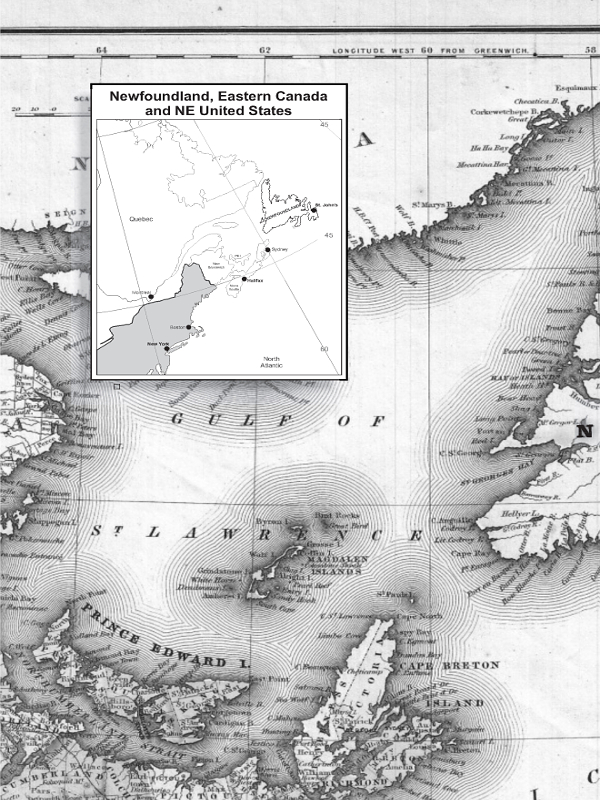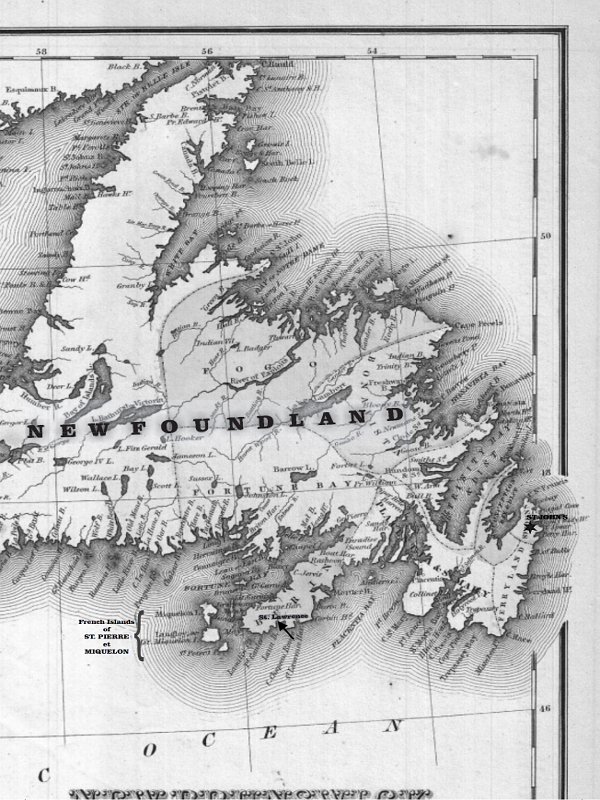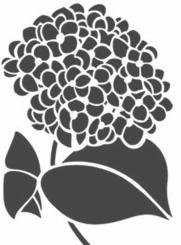Dancing In a Jar
Authors: Poynter Adele


A
S
E
D
O
N
A
T
R
U
E
S
T
O
R
Y
DANCING
IN
A
JAR
Adele Poynter



F
O
R
Alex, Patrick, and Kate

 | BREAKWATER P.O. Box 2188, St. John’s, NL, Canada, A1C 6E6 WWW.BREAKWATERBOOKS.COM |
A CIP catalogue record for this book is available from Library and Archives Canada.
Copyright © 2016 Adele Poynter
ISBN
978-1-55081-630-3
Map created by CeAnne Giovannini
ALL RIGHTS RESERVED
. No part of this work covered by the copyright hereon may be reproduced or used in any form or by any means–graphic, electronic or mechanical—without the prior written permission of the publisher. Any request for photocopying, recording, taping or storing in an information retrieval system of any part of this book shall be directed in writing to Access Copyright, One Yonge Street, Suite 800, Toronto, Ontario, M5E 1E5.
We acknowledge the support of the Canada Council for the Arts, which last year invested $153 million to bring the arts to Canadians throughout the country. We acknowledge the financial support of the Government of Canada and the Government of Newfoundland and Labrador through the Department of Tourism, Culture and Recreation for our publishing activities.
PRINTED AND BOUND IN CANADA.

 | Breakwater Books is committed to choosing papers and materials for our books that help to protect our environment. To this end, this book is printed on a recycled paper that is certified by the Forest Stewardship Council ® . |
CONTENTS
She is…
a woman pressed into the shape of a small jar, possibly attempting to dance in there. It shows in the way she places a seashell on a window sill, a red-painted chair in the corner: she is practiced in the art of creating a still life and taking up residence inside it.
BARBARA KINGSOLVER, THE LACUNA
This story spun around in my head for several years before I felt brave enough to start writing. Then when my own life veered from my plan, I had extra motivation to pursue the project. Friends who were writing themselves—Susan, Margo, and Deanne—provided the added incentive. My brothers Tom, Don, and Rob were very anxious to see something done with the original letters, so they provided sweet but constant pressure not to give up. Dr. John Martin made a significant contribution to understanding the full story of the St. Lawrence mines. I was so fortunate to spend time with him during his research, which helped my own understanding of a complex situation. It also allowed me the delight of spending hours with a fascinating individual.
One of my reasons for writing was to help my children get to know their grandfather at a very special time in Newfoundland history. They paid me back by helping with the typing. It is my wish this book reminds Alex, Patrick, and Kate that much of who they are comes from the people who came before them. I trust this will be the same reaction of all my nieces and nephews who read this book. I particularly hope this rings true for my sister’s four sons—Don, Jack, Paul, and Jim—and will help them to better understand their complex and gifted mother.
My cousins Gemma and Betty, and my Uncle Gus all helped me to better understand St. Lawrence, then and now. My brother, Tom, years ago had dutifully audio taped some members of the Poynter and Crammond families. Those conversations helped fill in some gaps. My nephew, Don, found some more material in his mother’s things and sent them along. To everyone I am truly thankful.
Sister Charlotte Fitzpatrick was a great source of knowledge on the history of the Order of the Sisters of Mercy in Newfoundland. During the writing process, I was fortunate enough to share time with my friend Dorothy who exemplifies all that is good about rural Newfoundland. My friends Maureen and Becky were instrumental in helping me prepare the manuscript to send to publishers. Unfortunately when she closes her eyes at night, I know Becky sees extra spaces, capitals where they shouldn’t be, and other formatting gremlins. I’m sorry for that, but her help was instrumental. Gemma helped me sort through the final edits from the publisher who was mercifully gentle on me. I owe “you all” so much.
As always my mentor, Gretchen Bauta, inspired me in this project as in so many others.
A host of people—Mary, Tarie, Clare, Christina, Paida, and Espie as well as my doctor, Marie—all kept me comfortable and able to finish this process even as my physical abilities declined.
I’d also like to thank Rebecca Rose and James Langer for making this book a priority, and Rhonda Molloy for her beautiful design.
My husband, John, supported me as he does in everything I do. That’s the beauty of being loved in precisely the right way.
I
WAS ELEVEN when I discovered that my father had been married before. It’s a sad reflection on the genius of us four children that it took so long to realize that our oldest sister, Barbara, was a child from a previous marriage.
Just as I tell it in this book, my father married Urla Crammond, his childhood sweetheart, in the fall of 1933 and they immediately left New York for St. Lawrence, Newfoundland. The story from my father’s family was always the same: Urla went to St. Lawrence against the good judgment of the Crammonds and the Poynters. She loved Dad and did not want to be away from him. She found St. Lawrence to be an impoverished, isolated place, and she was anxious to return to the United States. She particularly did not want Barbara to grow up there. Before too long she returned to the United States and died while receiving medical care. This version of the story presents it as a tragedy not to be spoken of.
Tragedies, of course, are always intriguing. I was interested in knowing more about the story, and about my father when he was younger. My father was forty-nine years old when I was born and sixty-nine when he died. I knew him barely twenty years. I only
knew his older self, whom I loved dearly, but I also loved stories about his adventurous early life and there were plenty of those.
